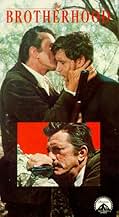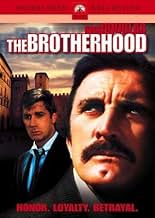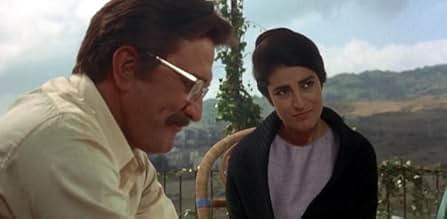Aggiungi una trama nella tua linguaThe son of a powerful Mafia don comes home from his army service in Vietnam and wants to lead his own life, but family tradition, intrigues and powerplays involving his older brother dictate... Leggi tuttoThe son of a powerful Mafia don comes home from his army service in Vietnam and wants to lead his own life, but family tradition, intrigues and powerplays involving his older brother dictate otherwise, and he finds himself being slowly drawn back into that world.The son of a powerful Mafia don comes home from his army service in Vietnam and wants to lead his own life, but family tradition, intrigues and powerplays involving his older brother dictate otherwise, and he finds himself being slowly drawn back into that world.
- Regia
- Sceneggiatura
- Star
- Premi
- 1 candidatura in totale
- Pietro Rizzi
- (as Joe DeSantis)
- Man at table
- (non citato nei titoli originali)
- Antonio
- (non citato nei titoli originali)
- Wedding Guest
- (non citato nei titoli originali)
Recensioni in evidenza
Fair production about Italian-American mobsters with plenty of drama , thrills and fine performance.
The central theme of the film is the confrontation between two hot-headed brothers from a Mafia syndicate, who clash over old and new methods and the changing of the guard in the Family. In this film, Kirk Douglas, dressed up with a drooping mustache and dyed hair, excels in his role as a New York syndicate board member who has nostalgic memories of how much better things were done in the old Mafia days. Not surprisingly, he turns on the syndicate and runs off to retire to Sicily. The picture is passable and acceptable enough, but not remarkable. Martin Ritt can't do much with the chest-beating that accompanies this tale of brotherly love, self-sacrifice and providing a far-fetched as well as failed notion of believably portraying the physical aesthetic and singular temperament of Sicilians. So he slowly and stolidly makes his way through the bitter and the new, stopping for a few interesting and exciting scenes. Kirk Douglas gives the best performance with his usually over-the-top style allowing him to liven things up; far below is newcomer Alex Cord, who gives an inferior and weak interpretation compared to that of the Hollywood towering Kirk Douglas. Much of the movie's failure was attributed to lack of chemistry between Kirk Douglas and Alex Cord. While normally fine Greek actress Irene Papas is really wasted and Luther Adler briefly steals the show as a plump, greasy, rather likeable snitch who becomes respectable. Joining these superior actors are a host of well-known supporting actors, such as: Susan Strasberg, Murray Hamilton, Eduardo Ciannelli, Joe De Santis, Connie Scott, Val Avery, Alan Hewitt, Barry Primus, and look for very brief appearances from Hal Holbrook, and even Paul Reubens.
In the film there is also a historical remark when the role played by the old mafia boss Eduardo Ciannelli explains that it is necessary to carry out a bloody revenge for some events of the past, thus he refers to notorious kingpin Lucky Luciano and about the person to be killed, a stool pigeon who told Lucky the people to murder. Luciano was one of the bosses of the Mafia and leader of Cosa Nostra or Mafia, and soon became a chief in the Reina Family during the height of the Castellammarese War. Subsequently, taking place a Mafian War between Salvatore Maranzano, who eventually defeated the faction headed by rival Joseph Masseria . After Masseria's murder , this position was short-lived, as Maranzano himself was murdered in 1931. Then , the family is headed by Charles "Lucky" Luciano , eventually known as the Genovese Family. He orders the slaughter of 40 other responsible , a famous massacre nicknamed Sicilian Vespers, therefore becoming the only boss.
The motion picture was professional but unevenly directed by Martin Ritt and it did not do very well at the box office. As a result, studios were reluctant to do more Mafia stories, that's why it almost convinced Paramount not to make The Godfather (1972). ¨Edge of the city¨(1957) resulted to be Martin Ritt's first directing assignment after being blacklisted in the 1950s and he went on to direct 25 more films, including some classics. Ritt was an expert on dramas such as ¨Stanley and Iris¨ , ¨Nut¨ , ¨Norma Rae¨ , ¨The front¨, ¨The Sound and the Fury¨ , ¨Black orchid¨ , though also directed films of all kind of genres such as : ¨The Spy Who Came in from the Cold¨ , ¨The Great White Hope¨ , and ¨Molly McGuire¨ . Martin Ritt worked with Paul Newman in two Westerns : ¨Hombre¨ and ¨Outrage¨ and two dramas : ¨Hud¨, ¨Hemingway's Adventures of a Young Man ¨. ¨Mafia¨ rating : 6/10, a decent family thriller . It will appeal to drama enthusiasts and Kirk Douglas fans. Well worth watching, it's considered to be an adequate precedent to ¨The Godfather¨, although it is not one of Martin Ritt's best films.
THE BROTHERHOOD is nothing like any of those films. Set in Sicily, it stars a then 52 years old Kirk Douglas, who lived to nearly double that age and still looked quite lithe and young, playing Frank Ginetta, a Mafia man about to become godfather who is given a most unenviable task, that of icing his brother Axel's father in law for blabbing, thereby ensuring the deaths of 41 Mafia members.
I feel that the film's first half carries too much unnecessary talk, despite helping to situate relations - especially the love between Frank and his wife Ida, well played by Irene Pappas.
The film carries an obvious but highly moral lesson: if you are involved in crime you end up a criminal and sooner or later there is a price to pay. Usually your life. In this case, Frank's father passed his knowledge to his son who now wants to bring his brother into the fold - all stays in the family, but nothing is wholesome.
In many ways, THE BROTHERHOOD is a forerunner to THE GODFATHER, which would come out three years later and would become one of the greatest films in cinema history.
Thus, it is definitely worth watching. 7/10.
Kirk Douglas is Frank Ginetta a made man, high up in the councils and his younger brother Vince played by Alex Cord who's just back from the Army like Michael Corleone was. But Michael married an outsider while Vince Ginetta is marrying the daughter of another Mafia capo, Luther Adler.
Though he's younger than Adler, Douglas is a guy who likes to do things the old fashioned way, the way his dad who was a button man back in the day did them. He also loves hanging around with the ancient survivors of the old Mafia wars among them Eduardo Ciannelli. Adler and Douglas get to be at loggerheads over Cord and the role he should take in the business.
The old guys learn something and give Douglas a contract that's going to cause him considerable problems, personal and organizational. What's a good Mafia guy to do when you get a contract. Then Alex Cord is given a contract to make his bones so to speak.
The main difference between the Godfather films and this is that the Brotherhood is set in the present, whereas the Godfather films are rooted in the past. By 1968 organized crime at the highest levels was hardly an Italian only concern. You don't see hardly any non-Italians in the first Godfather film and in the second the alliance is pretty wary. The non-Italians dominate the high councils in New York, Val Avery, Alan Hewitt and Murray Hamilton together with Luther Adler outvote Douglas all the time.
Martin Ritt shot a whole lot of this film in New York and many of the sites are recognizable to a native New Yorker. Still it's not one of his better films and it took Francis Ford Coppola to do the modern gangster film right.
One thing though, Douglas certainly did NOT heed Vito Corleone's advice about keeping your friends close and your enemies closer. Not that the higher ups wouldn't have found out at some point anyway, but when you watch The Brotherhood you'll know that Douglas was the obvious suspect when he makes that fateful hit.
This film died a quick death at the 1968 box office, becoming enough of a concern that some Paramount executives were worried about spending the big bucks on a film adaption of Puzo's The Godfather a few years later. The Francis Ford Coppola film, of course, was a huge hit which has gone on to become a film legend, while The Brotherhood is pretty much forgotten today.
But this earlier Martin Ritt directed Mafia exploration, while lacking the drama and epic quality of the Coppola film, still has some things to recommend it. Kirk Douglas is solid as one of the heads of a Mafia syndicate in conflict with other heads of that organization as to how to deal with "finks," as Douglas calls them. The other heads want to stay out of the headlines as much as possible. They also want to expand the business in ways that the more cautious Douglas doesn't like.
The Brotherhood precedes The Godfather by having a big marriage sequence in which all members of the family and old members of the Mafia gather for a festive occasion. Douglas plays the gracious host, and is full of ebullience and charm. At one point, though, he takes a few seconds to talk to two torpedoes who have just returned from having Douglas that is the highlight of the production. For reasons of plot giveaways I can't reveal the contents of this tense sequence. Suffice it to say, if the film had had one or two other scenes as potent as this one The Brotherhood might be better remembered today.
A minor crime drama, in the final analysis, one distinguished by some good performances, and that gripping scene between Douglas and Adler. made a hit for him. Reassured from them that all went well, Douglas is immediately back to the smiles and charm as party host.
Cast in the role of Douglas's younger brother who wants into the organization is Alex Cord. I'm tempted to call him Alex Cord of Wood because that would best sum up his performance. If ever there was a contrast in what is and is not charismatic on screen it would be a comparison between Cord and Douglas.
Irene Papas, playing Douglas's wife, is largely wasted in the film, I'm sorry to say. However, playing an old time Mafioso big boss that Douglas respects is Hollywood veteran Eduardo Ciannelli, and Ciannelli is terrific in his part, with one scene that is quite riveting. It's nice to see the character actor with an opportunity to still strut his stuff in a role that was ideal casting for him (you might regard it as the character that he had played in 1937's Marked Woman thirty years before).
Also impressive in this drama is Luther Adler as one of the heads of the Mafia. Luther will play a very strong scene in this film with Douglas that is the highlight of the production. For reasons of plot giveaways I can't reveal the contents of this tense sequence. Suffice it to say, if the film had had one or two other scenes as potent as this one The Brotherhood might be better remembered today.
In the final analysis, this is a minor crime drama, one distinguished by some good performances, and that gripping scene between Douglas and Adler.
Lo sapevi?
- QuizWhen this film came out, it did not do very well at the box office. As a result, studios were reluctant to do more organized crime stories. The failure of this film almost convinced Paramount not to make Il padrino (1972).
- ConnessioniEdited into Lo schermo a tre punte (1995)
I più visti
- How long is The Brotherhood?Powered by Alexa
Dettagli
Contribuisci a questa pagina























